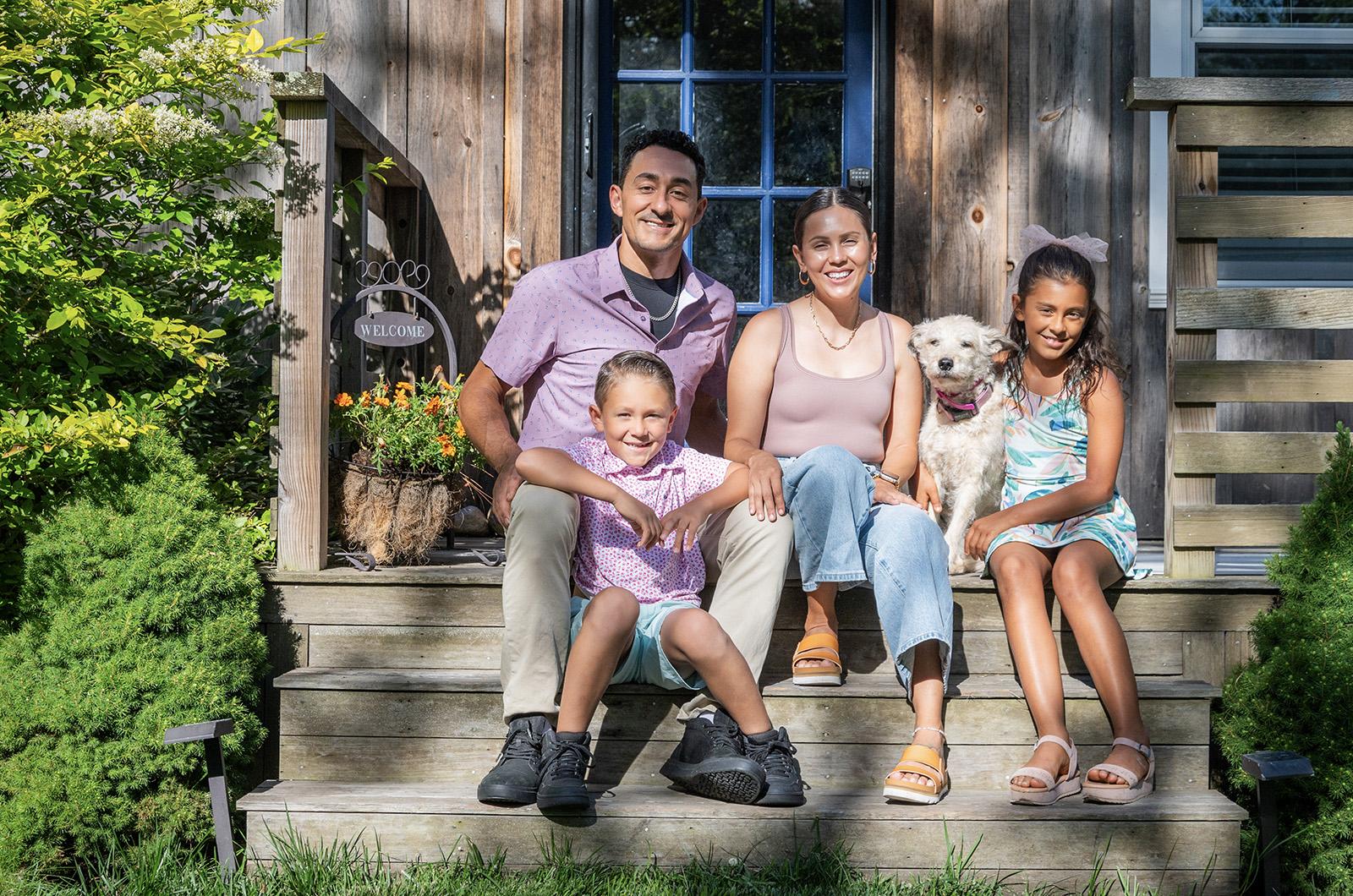When Tony and Vikki Cortez returned to the Island in 2015, they started doing the “Island shuffle.”
“Between 2015 and 2020 we moved six times,” Ms. Cortez recalled.
After bouncing between friends and family, couches and basements, and after dozens of applications to local housing lotteries, the two were selected for a Habitat for Humanity home in 2020.
Over the course of the pandemic, Mr. and Ms. Cortez, along with their two young children, helped turn floor-plans and an empty lot on Edgartown-Vineyard Haven Road into a permanent Island home.
“We’ve been blessed by Habitat for Humanity. They changed my life,” Mr. Cortez said.
Now, his kids will have a place to live on the Island: “forever.”
Smaller in scope than other local groups, and relying largely on private donations rather than public funding, Habitat for Humanity focuses on building single-family homes for private ownership. Two new single-family Habitat for Humanity homes are under construction on the Island. Applications for the two homes opened in June and close later this month.
In West Tisbury, the first of the two new Habitat for Humanity homes stands framed and insulated. In Oak Bluffs, designs for a second home have been finalized and permitted, with clearing set to begin soon.
With Habitat homes, homeowners are selected by application rather than by lottery, and are expected to dedicate 200 hours to the completion of their home, Martha’s Vineyard Habitat for Humanity executive director Greg Orcutt explained.
Habitat for Humanity’s Martha’s Vineyard chapter has built 17 homes on the Island since it began in 1996. The organization serves as the primary lender for its homeowners, typically offering home recipients a 30-year mortgage at 0 per cent interest, with a payment schedule that can flex according to a family’s changing financial situation.
“The payments are incredibly low, and when someone is in financial trouble or struggling, because we’re the lender, we’re able to offer a level of forgiveness that is quite different than other housing services out there,” said Habitat for Humanity board member Lora Ksieniewicz.
Other organizations often require lottery winners to independently apply for a mortgage, which can be a difficult process for many families, and one that jeopardizes the long-term stability of housing, Ms. Ksieniewicz continued.
Of Habitat for Humanity’s 17 completed homes on Martha’s Vineyard, only one family has had to leave their Habitat housing for financial reasons, she said.
Since Martha’s Vineyard Habitat for Humanity does not rely on state or federal funding, it can also restrict its ap
plicant pool to Island residents, which other housing agencies cannot, Ms. Ksieniewicz added.
Tony Cortez grew up on the Island and met his wife Vikki while the two served in the military. In a helicopter accident, Ms. Cortez was permanently disabled. After spending a few years in her home state of New Mexico, the couple decided to return to the Island to live closer to family.
But they weren’t sure whether the Island would be a sustainable place to live until being selected for their Habitat for Humanity house.
“When we first were told that we were getting this house, we came out to the property and it was just an empty lot,” Ms. Cortez said. “But we were grateful for anything. We were just excited to see that, you know, our kids would have a place to live . . . . This just brought so much security to our lives.”
Mr. Cortez, who works for Brennan Heating and Cooling, immediately set to work on their home’s construction, helping with everything from the foundation pour to the installation of the last bits of decorative hardware. Even the Cortez children, three and five years old at the time, pitched in when they could, picking up trash and keeping their parents company.
“All four of us were there every day, all day. We were in a horrible situation at our current housing so we were just like, okay, let’s just go help move this process along,” Mr. Cortez recalled.
Habitat for Humanity’s financial independence from state and federal funding allows them to focus on building housing for community members in the lowest income tiers, in the 60 to 80 per cent area median income range, Mr. Orcutt said.
“We’ve helped teachers, contractors, police, tradespeople. We have got somebody who works for Vineyard Wind,” Mr. Orcutt said.
“At that income level, [even] if you were able to find a rental, you couldn’t afford to save money to buy a house,” Mr. Orcutt added.
On the Island, Habitat for Humanity depends largely on donated land, supplies and time. On the West Tisbury home’s plywood floor sit boxes filled with new home goods: sinks, toilets, flooring, vanities, a medicine cabinet and even a bath tub, donated by a long list of Island residents, contractors and businesses.
Mr. Cortez, like all Habitat for Humanity homeowners, continues to contribute an additional 20 hours each year to further Habitat construction projects. His box truck is a regular sight at Habitat construction sites around the Island, and he referred to himself as the “muscle” for new projects.
“I told them I’m forever grateful, so I’d always be there for them,” Mr. Cortez said. “Now we’re all set. We got a home. We’re all good to go.”








Comments (2)
Comments
Comment policy »